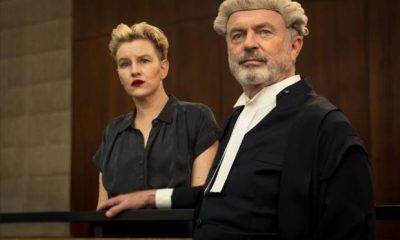Features
All You Need Is Greed: 10 Classic Movies of Corporate Corruption
White-collar hoodlums have been sliming their way across movie screens for years. From the conniving, power-hungry Loren Shaw in 1954’s Executive Suite, to the guru of greed Gordon Gecko in Oliver Stone’s Wall Street, the corporate crook has proved to be a villain as entertaining as s/he is infuriating. In the all-you-need-is-greed corporate world, there is no greater obligation than raising the dividends, and if thousands of lives are thrown into turmoil, well, who cares?
Now while we would be the first to condemn greed in any guise, we can’t help but celebrate these ten paeans to corporate vice. Michael Douglas in Wall Street
Wall Street (1987)
The CEO of corporate greed films, Oliver Stone’s 1987 masterpiece encapsulates the unfettered yuppie excesses of the ’80s and makes a coherent point about the predatory nature of commerce. Michael Douglas, in a stunning, Oscar-winning performance, is Gordon Gekko, unscrupulous corporate liquidator, stock market speculator, and “player”; Charlie Sheen is the fresh-faced broker eager for a piece of the pie. Gekko’s famous “Greed Is Good” speech (“Greed — for want of a better word — is good. Greed clarifies, cuts through, and captures the essence of the evolutionary spirit.”) remains the ultimate mantra for the monetarily obsessed.
William Holden in Executive Suite
Executive Suite (1954)
Make no mistake, corporate avarice was just as ruthless fifty years ago as today. The Robert Wise-helmed 1954 business melodrama chronicles the power grab between five vice-presidents following the death of their company’s leader. A terrific ensemble cast features William Holden as an enterprising free spirit who wants to return pride to the workplace, and Fredric March as a slimy businessman concerned only with making money. March’s character, a specialist in digging up dirt and manipulating others for his own personal gain, positively drips with evil. When Holden confronts him with populist wisdom like “You can’t make men work only for money, you starve their souls!” March coldly responds, “My job is to plug every profit leak!”
Silkwood (1983)
Meryl Streep carries the load in this industrial-strength docudrama about the unfortunate life of Karen Silkwood, the nuclear plant employee who died under mysterious conditions as she was about to blow the whistle on the Kerr-McGee corporation for hazardous working conditions. Director Mike Nichols fleshes out the tale with at-home moments of Silkwood and her zany housemates (including Cher, who won an Oscar for best supporting actress) but the obvious focus is on the heinous practices of Kerr-McGee management who, in the name of the almighty dollar, allowed their employees to contract radiation poisoning. And you thought your boss was a jerk!
Quiz Show (1994)
The real-life quiz show scandal of the 1950s serves as the basis for one of Robert Redford’s finer directing efforts. Ralph Fiennes plays Charles Van Doren, a handsome, brilliant, and utterly marketable contestant on ’50s game show 21. While Van Doren was certainly capable of answering the challenging yet not impossible questions, TV executives provided him with answers in advance to ensure that he would unseat the reigning champ — the sweaty, unattractive, and very Semitic Herbert Stempel (John Turturro). Quiz Show explores themes of anti-Semitism and the naivete of early television audiences, and also examines the insidious way that greedy execs corrupted all that was good about the show in order to boost ratings. All in all, it’s a sober illumination of the way television and advertising became seedy bed partners.
Richard Pryor in Blue Collar
Blue Collar (1978)
It’s bad enough when your corporate bosses screw you over, but what do you do when you discover that your union’s also corrupt? That’s the problem faced by Harvey Keitel, Yaphet Kotto, and Richard Pryor in this searing drama set amongst the assembly lines of a Detroit auto plant. Brilliant performances (particularly from Pryor who is simply amazing) and a script that pulls absolutely no punches make Paul Schrader’s directorial debut the best unknown movie of the 1970s.
How to Get Ahead in Advertising (1989)
This uproarious attack on the advertising industry is propelled by Richard E. Grant’s manic, absolutely enthralling performance as Dennis Bagley, the most cynical and ruthless ad exec imaginable. A man blessed with an almost mystical power for manipulation — he can convince the obese that they will lose weight by eating sausages — Bagley suddenly undergoes a most odd and unpleasant transformation…. Funny, ferocious, and filled with memorable dialogue, this is scathing satire as only the British can create.
A Shock to the System (1990)
Michael Caine steals the show in this ultra-black comedy that puts a murderous spin on office politics. When aging executive Graham Marshall (Caine) gets passed over for a promotion that goes to a snotty young co-worker, he gets good and mad. Using highly unorthodox methods, Marshall begins his rise up the corporate ladder. With tongue firmly in cheek, this bizarre tale provides an interesting counterpoint to Executive Suite. In that film, when the “new” way of doing business threatened the moral foundation of working America, good eventually won out. In this scenario, the solid and traditional values of American business are maintained through murder and mayhem!
Glengarry Glen Ross
Glengarry Glen Ross (1992)
Perhaps more a brilliant observation of how the bottom-feeders of the business world survive (in this case, a bunch of loser real estate agents trying to sell Grade-A crap), then a true corporate greed flick, this film still packs a hell of a “greed” wallop. It also features some of screenwriter David Mamet’s most memorably macho dialogue. The scene in which Alec Baldwin delivers a motivational speech — berating the entire sales team and informing them that they must compete in a sales competition with the losers getting canned — literally explodes off the screen. The incredible ensemble cast includes Kevin Spacey, Al Pacino, Ed Harris, and, in an agonizing-to-watch performance, Jack Lemmon as the hapless agent who always seems to find a bottom below the bottom.
Tucker: The Man and His Dream (1988)
The spirit of free enterprise battles big business and political corruption in Francis Ford Coppola’s lush epic. Set in the late 1940s, this true story centers on automaker Preston Tucker (Jeff Bridges), whose dreams of building the car of the future crashed and burned when he took on the Big Three: Ford, Chevrolet, and GM. Coppola seems more preoccupied with making pretty pictures (courtesy of Vittorio Storaro’s cinematography and Dean Tavoularis’ production design) than telling a good story, but this is nonetheless fascinating, particularly when one considers the parallels between Tucker and Coppola himself.
Citizen Kane (1941)
You may have heard of this little film, based on the life of millionaire newspaper magnet, William Randolph Hearst. As played by Orson Welles, Charles Foster Kane is a man who has devoted his life to acquiring businesses, power, wealth, and women. But where does all that get him? Alone, miserable, and mumbling something about “Rosebud” with his last breath. Though Kane has a reputation as the greatest American film ever, don’t think that means it’s not entertaining. Far less dated than any movie from the early ’40s has a right to be, Kane holds up remarkably well as a stylish exploration of the debilitating nature of power and greed.












































